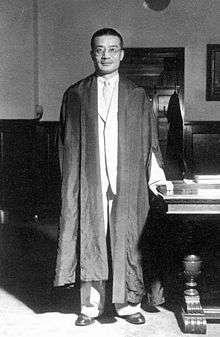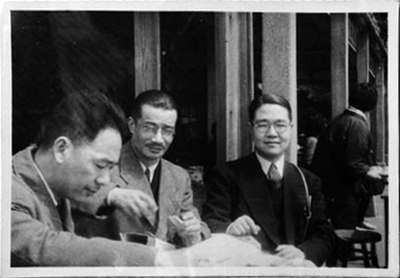Mei Ju-ao
Mei Ju-ao (Chinese: 梅汝璈; pinyin: Méi Rǔ'áo, 7 November 1904 – 23 April 1973) was a Chinese jurist, legislator and author.
Mei Ju-ao | |
|---|---|
 | |
| Personal details | |
| Born | 7 November 1904 Nanchang, Jiangxi (Qing Dynasty) |
| Died | 23 April 1973 (aged 68) |
| Alma mater | Tsinghua University (1924) Stanford University (1926) University of Chicago Law School (1928) |
| |
Education
Mei was born in Nanchang, in eastern China's Jiangxi province. At the age of 12, Ju-ao was admitted into a school on the site of what is now Tsinghua University, moving from Nanchang to Beijing in pursuit of a good education. After graduating, he received financial assistance to study literature at Stanford University in California, receiving a Bachelor of Arts degree in 1926. While there, he was elected a member of Phi Beta Kappa Society. Mei later received a Juris Doctor from the University of Chicago in 1928. After spending a year traveling around Europe, Mei returned to China in 1929.[1]

Tokyo Trials
During the period of 1946-48, Mei was the Chinese judicial delegate to the International Military Tribunal for the Far East. He participated in the trials of Japanese war criminals shortly after the Second World War.
Mei was portrayed by Damian Lau in the Chinese film The Tokyo Trial (2006) and by David Tse in the NHK miniseries Tokyo Trial (2016).
Later life
Mei returned to China after the Tokyo Trials. He was a supporter of Mao Zedong, but, having been a member of the previous government and having received a "bourgeois" Western education, he faced some persecution. However, by the end of his life, he had gathered enough favor with the communists that he was no longer deemed a "class enemy" by the government. He even served in some government positions. He was a member of the Chinese People's Political Consultative Conference and a special consultant to the Foreign Ministry.[2]
Work
- "China and the Rule of Law." Pacific Affairs, Vol. 5, No. 10. (Oct., 1932), pp. 863–872. (Available through JSTOR)